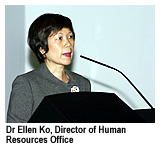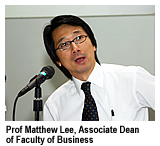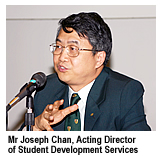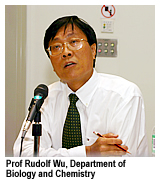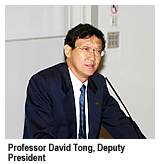New salary proposals debated
Shuyee Chen
Will the new salary scales and pay-raise system, proposed by the Management Board’s Core Group On Staffing Policies To Tackle The Budget Constraints, be an effective way to tackle the University’s budget deficit? Is the pay-raise mechanism acceptable to existing staff? Should the University establish a set of clear and objective criteria to assess staff performance? These were some of the questions raised by the more than 100 staff members who attended the open forum on these issues. The forum, held 14 April, was organized by the Human Resources Office (HRO).
Although there was no obvious objection to introducing such a culture, concerns were raised and points debated as to how to ensure an objective and transparent mechanism to assess staff performance. In paragraph 8 of the Proposed New Salary Scales and Pay Raise System consultation paper (for the proposals’ salient features, please see the table below), it is stated, “Pay raise will normally be awarded for good to outstanding performance. Recognition should be given to staff members who take up extra workload, wider and/or higher level responsibilities.” Some staff questioned the meaning of words such as “good,” “outstanding,” “extra” and “higher.” “We support the performance-based evaluation system,” said one staff member, “however, without a set of clear and measurable criteria, the system can be abused easily.”
Professor Matthew Lee, Associate Dean of the Faculty of Business, and a member of the Core Group, agreed with this point. He also noted that such objective criteria should be incorporated at the beginning of the cycle of annual evaluation, so that staff will know exactly what is to be assessed.
As to how to develop a set of reliable criteria for all staff, Mr Joseph Chan, Acting Director of Student Development Services and also member of the Core Group, offered that all jobs generally have two elements—qualitative and quantitative. “In a way, it’s
The need to establish an appeal mechanism was also raised at the forum. According to the proposals, the Approving Committee and the Line Manager are to be the final decision makers for academic and non-academic staff, respectively, in considering a pay raise. There is no opportunity to appeal a case. Staff urged the university to reconsider this, so as to avoid unnecessary office politics. “We need a set of operational framework to ensure that the good intentions of the proposal are implemented and to build a better working environment for all staff,” another staff member at the forum remarked.
Among the proposals, the Core Group took the opportunity to create a parallel career path for those staff members who prefer to focus primarily on teaching. Two new post titles will be introduced: Senior Instructor I and II. Their terms of service are identical to those of the new Associate Professor and Assistant Professor, respectively. At the forum, a number of staff members argued that the change is not necessary and the re-titling is a demoralizing downgrade in status. They noted that 80% of the University Grants Committee (UGC) funding goes to teaching, while only 20% goes to research. One staff expressed the view that with the new role statement, CityU is defined primarily as a “teaching university,” and asked why it would be necessary to downgrade the title of staff doing a job which is more closely aligned to the university’s new mission statement.
In his closing remarks, Professor Tong thanked colleagues for expressing their views and urged them to face the high possibility of CityU’s 40% funding cut. This percentage includes funding withdrawal from associate degree and taught postgraduate programmes, as well as a 10% sector-wide budget cut in 2004-05, and a “0-0-X” percentage cut in 2005-08, where ‘X’ is no more than 5%. In the future, UGC funding is to be divided into three categories: 65% for undergraduate places consistent with CityU’s Academic Development Proposals, 25 % for research through the Research Assessment Exercise, and 10% based on role-related performance. “If we fail to do well in any of these three areas, we will not even be able to keep the remaining 60% funding,” Professor Tong said. Some universities, he added, are introducing major or across-the-board salary cuts. “The only way we can avoid this is to do well in all three areas. The only way we can do so is to keep the CityU brand desirable through good teaching and high quality applied research. The good brand will enhance the University's activities in generating new revenue through self-financing teaching. We have faith in our staff. Let’s stop being inward-looking. Together, let’s work toward building a better university and a better future for all,” Professor Tong urged.
The forum was chaired by Core Group members, Mr Joseph Chan, Professor Matthew Lee, Professor Rudolf Wu and Mr Gabriel Chan, Director of the Finance Office. Academic and non-academic staff heads were invited by the Core Group for consultation before the proposals paper was issued and sent to staff on 26 March. All staff were invited to the open forum to express their views. Opinions collected at the forum will be considered before the proposal is presented for Council approval.
| The main points of the new proposal, to be implemented on 1 July 2004, include: | |
| 1. | A set of revised salary scales will be implemented for those new academic staff and non-academic staff appointed on and after 1 July 2004. |
| 2. | The new salary scale for each grade of academic (except for chair professors) or non-academic staff shall specify a range with fixed incremental steps. There will be no automatic increments, however. |
| 3. | A new pay-raise system will be introduced, based on the budgetary situation of the University and taking into account "good" or "outstanding" performance of the staff. Half or one increment of the salary scale may be awarded. |
| 4. | All current staff will remain on the existing scales of their respective grades, but they will be subject to a new pay-raise system (and a common incremental date of 1 July). Serving staff on gratuity-bearing contracts can normally retain their existing salary scales corresponding to their grades, when their contracts are renewed. |
| 5.
| For those serving staff whose current salary has reached the maximum point of their respective scale, there will be no increment/pay raise, except promotion to a higher grade. |
| 6. | Two new post titles, Senior Instructor I and II, will be introduced for those staff members who wish to focus on teaching. |
| 7. | Associate Professor Scale B and Scale A will be merged into one scale. The Lecturer and the Tutor/Senior Tutor grades will be phased out, with no new appointments to be made in the future. |
| 8. | If the Government allocates additional money for cost-of-living adjustment purposes, the University will apply such adjustments accordingly. |
